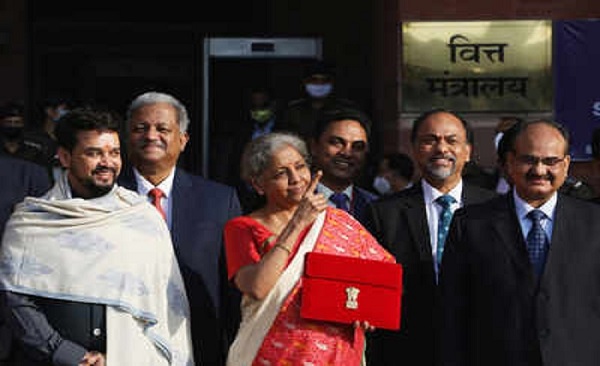Sitharaman has scrapped income tax for senior citizens under certain conditions and said new rules will be notified for removal of double taxation for NRIs
NEW DELHI – The 2021-2022 budget presented by Union Finance Minister Nirmala Sitharaman on Monday has allocated Rs 2 lakh crore for the health-care, including Rs 35,000 crore for the covid-19 vaccine, pledged numerous infrastructure projects for poll-bound states–West Bengal, Assam and Tamil Nadu–and unfolded plans for the disinvestment of two public-sector banks and a general insurance company.
The budget is being presented at a time when the economy of the country has been undergoing a sharp slowdown since long due to the crippling lockdown, the demonetisation and other issues.
Sitharaman said the Budget proposals for this financial year rest on six pillars—health and well-being, physical and financial capital and infrastructure, inclusive development for aspirational India, reinvigorating human capital, innovation and R&D, and ‘Minimum Government, Maximum Governance’.
She has scrapped income tax for senior citizens under certain conditions and said new rules will be notified for removal of double taxation for NRIs, and also announced a reduction in the time period of tax assessments, among other measures.
In the healthcare sector, a new scheme, titled PM Atma Nirbhar Swasthya Bharat Yojana, will be launched to develop primary, secondary and tertiary healthcare. Also announced were Mission POSHAN 2.0 to improve nutritional outcomes across 112 aspirational districts, operationalisation of 17 new public health units at points of entry, modernisation of existing health units at 32 airports, 15 seaports and land ports, Jal Jeevan Mission Urban aimed at better water supply nationwide besides plans for strengthening of Urban Swachh Bharat Mission.
Sitharaman announced Rs 35,000 crore for the covid-19 vaccine. “The government is committed to providing more funds. The Budget outlay for health and welfare is Rs 2,23,846 crore in the 2021-22 Budget. This is a 137 per cent increase.”
In the education sector, 100 new Sainik Schools will be set up, besides 750 Eklavya schools in tribal areas and a Central University in Ladakh.
In the infrastructure sector, highway and road works were announced for Kerala, Tamil Nadu, West Bengal and Assam. A National Rail Plan will be created to bring about a future-ready Railway system by 2030. A 100% electrification of Railways will be completed by 2023. Metro services have been announced in 27 cities, plus additional allocations for Kochi Metro, Chennai Metro Phase 2, Bengaluru Metro Phase 2A and B, Nashik and Nagpur Metros. Gas pipeline project are to be set up in Jammu and Kashmir and the Pradhan Mantri Ujjwala Yojana (LPG scheme) will be extended to cover 1 crore more beneficiaries.
“For 2022, I propose a sharp increase in capital expenditure at 5.54 lakh crore, from Rs 4.39 lakh crore in 2021. More economic corridors are being planned to boost road infrastructure,” Sitharaman said.
The Finance Minister also announced Rs 1.10 lakh crore outlay for railways, of which Rs 1.7 lakh crore is for capital expenditure. Also, the Centre will provide Rs 18,000 crore for public buses.
In the agriculture sector, an agriculture infrastructure fund will be made available for APMCs for augmenting their infrastructure. About 1,000 more Mandis will be integrated into the E-NAM marketplace. Five major fishing hubs, including Chennai, Kochi and Paradip, will be developed. A multipurpose seaweed park will be established in Tamil Nadu.
Sitharaman proposed an increase in the agriculture credit target to Rs 16.5 lakh crore. “The MSP regime has undergone a change to assure a price that is at least 1.5 times the cost of production across all commodities. The total amount paid to paddy farmers surged to Rs 1.72 lakh crore in 2020-21.”
In the employment sector, a portal will be launched to maintain information on gig workers and construction workers. Social security will be extended to gig and platform workers. Margin capital required for loans via the Stand-up India scheme has been reduced from 25% to 15% for SCs, STs and women.






0 Comments